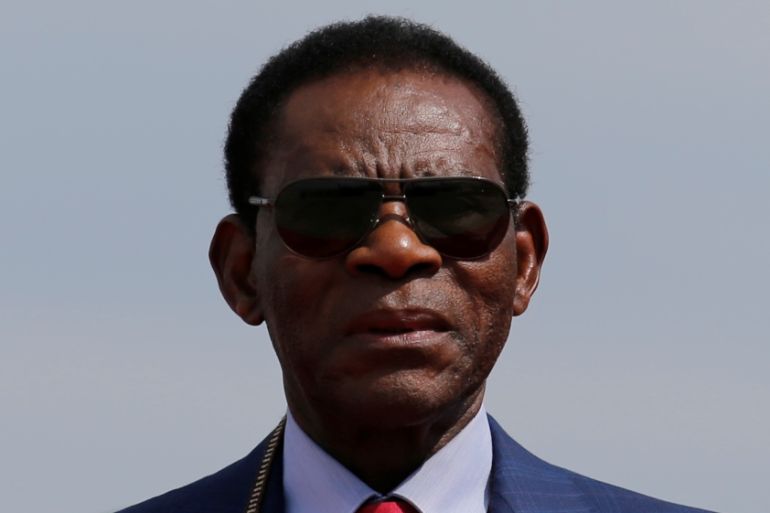Equatorial Guinea leader Obiang, 80, seeks to extend 43-year rule
Obiang, the world’s longest-standing president, wants to extend his 43-year rule in the oil-rich Central African nation.

On Sunday, Equatorial Guinea will hold elections in which the world’s longest-standing president, Teodoro Obiang Nguema, will seek to extend his 43-year authoritarian rule, marked by alleged rights abuses and corruption.
The Central African oil-producing nation of about 1.5 million people has had only two presidents since independence from Spain in 1968; Obiang and his uncle Francisco Macias Nguema who he removed in a coup in 1979.
Keep reading
list of 4 itemsThe Take: What would a third Modi term mean for India?
Full jury panel seated on third day of Trump’s New York hush-money trial
Jacob Zuma’s nine lives: How South Africa’s ex-president keeps coming back
The 80-year-old Obiang, always elected with more than 90 percent of votes in polls international observers have questioned, is vying for a sixth term against two other candidates: Andres Esono Ondo and Buenaventura Monsuy Asumu.
Parliamentary and local elections will be held at the same time.
Oil and gas production accounts for about three-quarters of revenues in the OPEC member state. But output has dwindled in recent years to about 93,000 barrels per day (bpd), from about 160,000 bpd in 2015 due to maturing fields.
Although the tiny Gulf of Guinea nation has seen major investments in infrastructure, critics say under Obiang, oil wealth has lined the pockets of his entourage, who flash luxury lifestyles while most of the population live in poverty.
Obiang is also accused of muzzling dissent and freedom of expression. The government has denied the accusations.
Protests are mostly forbidden, media is heavily controlled, and it is not uncommon for political opponents to be arbitrarily arrested and tortured, rights groups say.
Intimidation has increased in the run-up to the polls, activists say, with authorities targeting civil society groups and critics of the regime.
In September, security forces raided the headquarters of a banned opposition party – the only one with a seat in parliament – and detained at least 100 of its members.
“On Sunday, people will cast the vote the government expects them to, because you cannot freely speak up your mind in Equatorial Guinea,” human rights activist Tutu Alicante told Reuters.
“Whatever It Takes”
Repression before the vote has offset efforts by Obiang to improve his image abroad, the latest seen in a move to abolish the death penalty earlier this year.
“He is washing his face in front of the international community,” said Amnesty International’s Senior Campaigner for West Africa Marta Colomer.
Alleged corruption has also tainted Obiang’s tenure despite several pledges to increase transparency.
His son, Vice President Teodoro Nguema Obiang Mangue, who observers see as a potential successor, was convicted for embezzlement by a French court in 2020.
Assets that foreign powers say he bought with ill-gotten gains include a crystal-covered glove worn by Michael Jackson, an armoured Rolls-Royce limousine and a yacht.
Both father and son have consistently denied wrongdoing.
If re-elected, Obiang will face new challenges. The economy was hit by COVID-19 and although the war in Ukraine has boosted demand for non-Russian oil it has also brought a sharp rise in food prices.
“The opposition does not stand a chance,” Alicante said. “He is going to do whatever it takes not to leave power.”